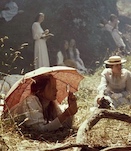Gallipoli
Users browsing this topic:0 Registered, 0 Hidden and 1 Guest
Registered Users: None |
 |
| View previous topic :: View next topic |
| Author |
Message |
Bruce Gonsalves 



Joined: 05 Jul 2012
|
| Post subject: |  |
|
| Not Gallipoli, but same era. I never met my English grandfather, mums dad, but up until 2 weeks ago I remembered the photos of him prior to ww1 with a face that had a contusion, for want of a better description, but he was my grandfather. Anyhow he fought in France, mum doesn't talk about what she knows as she had her own horrors during ww2. Two weeks ago, I saw some old photos of my grandfather and grandmother before he went off to war with a perfect face and such a good looking chap, this was only weeks before he copped a bullet through his mouth, forever disfiguring such a youthful face. |
|
|
|
 |
Mugwump



Joined: 28 Jul 2007
Location: Between London and Melbourne
|
| Post subject: |  |
|
Thanks Wokko, yep, i think that is true on all counts, though the Turkish story about scurry's self-firing rifles is an interesting one. It's hard to believe they'd be fooled by that, though it is a good story.
_________________
Two more flags before I die! |
|
|
|
 |
Tannin 

Can't remember


Joined: 06 Aug 2006
Location: Huon Valley Tasmania
|
| Post subject: |  |
|
| Wokko wrote: | | One thing I remember is early on there were many opportunities for breakthroughs when the overwhelming landing force had the Turks out of ammo, supplies and men and desperately waiting for reinforcement and resupply. Rather than pushing on they dug in, gave the Turkish forces time and the as with any invasion if the enemy can start bringing in fresh troops to prepared positions then its in trouble. |
This is actually the story of almost about every battle in that entire vast and lengthy war, and most of them in the next war too, but it wasn't a failure of generalship or intention, it was an inevitable consequence of the weapons and tactics available at the time.
Constantly we see the exact same story: attack goes in, meets with initial success, though at heavy cost, the enemy is in desperate straits and the prompt arrival of reinforcements is all you need to turn a local success into a major breakthrough. But the reinforcements never arrive. Year after year we see the same pattern: on the Eastern Front, on the Western Front, on the Somme, at Amiens, everywhere. How could the generals have been so stupid?
Ans: it wasn't their fault. In Napoleon's day, or Alexander the Great's for that matter, a good general could observe the general flow of the battle (perhaps from a nearby hill) and decide upon the vital place and moment for the mass de decision to be thrown in to clinch the victory. In general, troops were able to move around the battlefield, often under fire but more-or-less unhindered. A really good general could do all of that and have organised his forces beforehand such that a suitable body of troops was formed up and ready close at hand when needed. This is where Napoleon's genius is most evident: his extraordinary ability to get vast numbers of troops to the right place at the right time was unique.
But the development of new weapons and tactics in the mid to late 19th century made all that impossible. Starting with the later part of the American Civil War (after 1863, say) and more and more so with each conflict up to the extreme peak of this trend in 1914-1918, timely reinforcement of success became impossible. Trenches and machine guns were just the start of it; add to them masses of barbed wire and the unprecedented range and destructive power of artillery able to reach out into an enemy's rear areas and disrupt the assembly of new formations. Now throw in the miles of impassable mud churned up by the constant shelling. Also consider the vastly increased size of the armies in contact - millions of men!
Finally - and here is the kicker - consider the difficulty of communications. Because of all the above-mentioned factors, the only practical way to control a battle was by field telephone from a secure base far enough behind the lines to be out of artillery range. Long gone were the days when you could ride up and down along the ridge on a horse named Copenhagen and command your soldiers face to face. If you were close enough to be useful in the centre, you were far too far away to be in control of your left and right wings, and out of contact with your reserves. That's not generalship, it's disaster!
WW1 soldiers were scornful of the generals running battles from safe places miles away from the front, but there was simply no alternative. Generals sat miles to the rear and used the telephone to get reports and issue orders. Unfortunately, the first thing that happened every time there was a major engagement was the telephone lines got smashed. It was routine to lay three different lines in different places, and it soon became routine to - at vast cost in labour - bury them as deep underground as possible, but the intensity of shellfire in WW1 was such that communications nearly always went out not long after the attack started. That brought the generals back to guesswork and muddle. Hell, a lot of the time it didn't much matter what they decided to do as there was no way for them to get their orders through to the men at the front anyway. Subordinate commanders just had to do the best they could for as long as they were out of touch.
In response to this, as the war went on - let's say from around late 1915 through to about early 1917 - generals resorted to more and more pre-planning. They drew up vast and detailed movement orders weeks in advance and made sure that every formation had an exact place in the attack timetable. They choreographed massive and necessarily very complicated shipments of the thousands upon thousands of tons of materiel needed to arrive at the front each day: food, ammunition, bridging beams, gas masks, fodder for the horses (no self-propelled guns in those days remember - it was all done with sweat and horses), reinforcements, you name it. All this was done in advance and in detail so that when the attack went in and communications failed, the machine would keep on working anyway.
The trouble was - as Napoleon famously observed a hundred years before - no plan long survives contact with the enemy. 17 Division might meet unexpected resistance and get held up, 104 Division might make better than expected progress, hey presto, the long-planned reinforcements are now in the wrong place. Chaos! Or they go in according to schedule but - unknown to the general 'coz the wires are out - the bombardment failed and the wire wasn't cut and 3000 men get shot to ribbons by two machine guns and a post office clerk. More chaos! Or - worse still - the general manages to get word of changed circumstances and orders a formation to change its position but the message goes awry and half of them go one way, half another. These communication and intelligence screw-ups are the basic building blocks of war, and World War One in particular is full of them, and the cost of each one was measured in the thousands. Off hand, I can't think of one single battle where chaos didn't eventuate.
Still worse, these massive and detailed preparations - the only possible way to cope with the realities of trench warfare - could not be hidden from the enemy, and he made it his business to make them go wrong. And they did go wrong. Pretty much every single time. Four years, millions of lives, unprecedented expenditure in artillery shells and poison gas and fortifications ... and the line stayed pretty much where it had started. Neither side could gain meaningful victories. A handful of defenders turned back huge numbers of advancing enemy, over and over and over again. That's the story of the whole war.
This stalemate only changed with the introduction of a number of new factors. Tanks and aircraft made a difference, combined arms doctrine made a bigger difference. But it was the arrival of portable radio in the 1930s that really restored the possibility of generalship. Only then was it possible to, once more, control a battle and employ troops to advantage as Alexander and Lee and Wellington had done.
So, yep, those stories are true - but they don't mean much insofar as the same story was true of almost every single battle in that war.
_________________
�Let's eat Grandma.� Commas save lives! |
|
|
|
 |
Mugwump



Joined: 28 Jul 2007
Location: Between London and Melbourne
|
| Post subject: |  |
|
^ yes, Tannin, exactly right. Now there was one great difference in the earlier parts of the First world war, and it is that the German Army had a slightly different doctrine to the British. The bulk of the German land army was a professional army, and it had been trained along the principles of "independer denkende gehorsamt" , or "independent thinking obedience". The Germans emphasised the objective, rather than a detailed plan, and they allowed field commanders to act flexibly in line with that understanding. British doctrine (largely shared by Australians in 1915) emphasised conformity to the plan. When things went wrong, the British tended to stiffen the lip and press on with the plan regardless. That is one part of the reason for the disaster of the Somme offensive, and it also partly explains the infamous Light Horse assault on the Nek at Gallipoli (which was ordered by an Australian, not a Brit as the film implies).
This Germanic reliance on local initiative underlies the incident that you mentioned, Wokko.
It was on hill 971, the key high ground to the south east of ANZAC Cove, on the night of the 25th. Mustafa Kemal - the local Turkish commander on the spot - grasped the significance of holding that hill and issued his famous command to the retreating Turkish defenders :"I do not order you just to fight. I order you to die". When the retreating Turks stood up and started firing back, the onrushing Australians reasonably enough went to ground. That defined where the trench line lay by about the 27th April, and it scarcely moved thereafter. If the attack had been pressed, things might well have ended quite differently. There were several of these moments through the eight month campaign, but this is probably the most famous.
_________________
Two more flags before I die! |
|
|
|
 |
HAL

Please don't shout at me - I can't help it.


Joined: 17 Mar 2003
|
| Post subject: |  |
|
| Some days are better than others. |
|
|
|
 |
regan is true fullback



Joined: 27 Dec 2002
Location: Granville. nsw
|
| Post subject: |  |
|
| first world problems, eh Hal... |
|
|
|
 |
HAL

Please don't shout at me - I can't help it.


Joined: 17 Mar 2003
|
| Post subject: |  |
|
| By the way, do you mind if I ask you a personal question? And second? |
|
|
|
 |
David 

I dare you to try


Joined: 27 Jul 2003
Location: Andromeda
|
|
|
|
 |
Pies4shaw 

pies4shaw


Joined: 08 Oct 2007
|
| Post subject: |  |
|
| Something about a donkey? |
|
|
|
 |
Mugwump



Joined: 28 Jul 2007
Location: Between London and Melbourne
|
| Post subject: |  |
|
Really interesting, David, thanks a lot.
_________________
Two more flags before I die! |
|
|
|
 |
ronrat



Joined: 22 May 2006
Location: Thailand
|
| Post subject: |  |
|
You wonder whether the writer could have put an effort into something else. I mean does it really matter? Whoever wrote it or possibly interpreted it from Turkish did a sterling job.
It was doubtful that it ever specifically was meant to single out ANZACs in any case given the amount of English and French involved.
I wrote all Shakespeares plays, and my wife and I wrote his sonnets sort of stuff.
The word stir emotions and that is what is important. All the players are now dead.
_________________
Annoying opposition supporters since 1967. |
|
|
|
 |
David 

I dare you to try


Joined: 27 Jul 2003
Location: Andromeda
|
| Post subject: |  |
|
Really? You don't think factual reporting and correct attribution of quotes matter?
I get that sometimes the myth is more interesting than the reality, but it's hardly a waste of time to explore the origins of such things.
As Jack Nicholson didn't say, we can handle the truth.
_________________
All watched over by machines of loving grace |
|
|
|
 |
|
|
|
You cannot post new topics in this forum
You cannot reply to topics in this forum
You cannot edit your posts in this forum
You cannot delete your posts in this forum
You cannot vote in polls in this forum
You cannot attach files in this forum
You cannot download files in this forum
|
|



